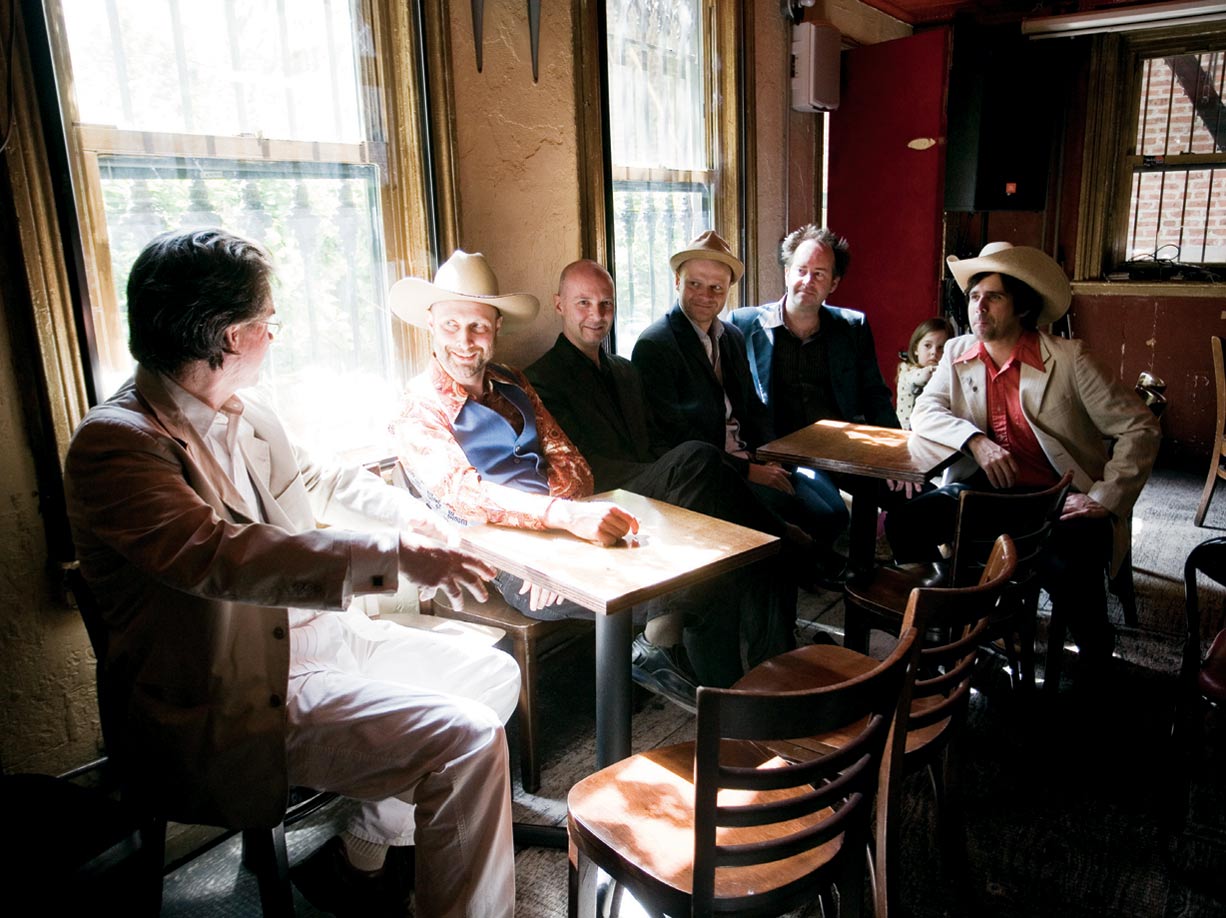Conan tracked down Infopesa, the label that put out a lot of the music, and found intact masters of many tunes. “I got in touch with a few of the guys who played in the first chicha bands and they were excited. Angel Rosado, who started Los Hijos del Sol, called the local newspaper and told them he was starting a new career in America. I felt like an imposter, because the label is so small, but I was glad to get him some recognition. The guitar player from Los Hijos lives in LA now, and he contacted me too.”
Conan’s compilation, The Roots of Chicha: Psychedelic Cumbias from Peru, got great reviews in 2007 and drew people to Café Barbes to hear Conan’s band playing their version of Amazonian psychedelica. “We started doing covers in that style. Like reggae, it has a strong rhythmic foundation, so anything you play in that style becomes chicha. In the beginning, we rearranged classical pieces and top-forty hits like ‘Indian Summer,’ which was a big hit in France in ‘72. We did the ‘Summertime’ movement of Vivaldi’s ‘Four Seasons’ — music that’s familiar to anyone who’s ever been on hold on the telephone. We wrote Spanish lyrics for it and called it ‘Primavera en la Selva.’ Since I own the club, it was easy to play regularly, and when we began to pick up fans, it was time to make a record.”
Chicha Libre includes Conan on Venezuelan cuatro, a guitar/ukulele hybrid that’s the main rhythmic instrument in Venezuelan folk music; Vincent Douglas, co-owner of Barbes on twang-heavy lead spaghetti guitar; Joshua Camp on Horner Electrovox, an electric accordion/organ hybrid that sounds like a cheesy Farfisa; Nicholas Cudahy on bass; and Greg Burrows and Timothy Quigley on congas, bongos, and various other percussive instruments.
“We play a music we didn’t grow up with and make a lot of mistakes doing it,” Conan says. “But it’s not unique to take on an unfamiliar music and make something new of it. [The record was] a collective effort, with room for improvisation, but we tried to stick to the dance format. We’re serious about the music, but it’s there to make people dance and have fun. It was music to celebrate weddings, funerals, and parties, and we want to keep that aspect of the music.”
“Chicha is a very accessible kind of world music, especially to American ears,” says Electrovox player Camp. “It references ‘60s AM radio psychedelia and surf guitar, then brings in indigenous melodies and the cumbia beat. And people love the sound of the Electrovox, which is a Farfisa in the housing of an accordion. It’s all electronic. There are no reeds in it. It was designed so the poor accordion players out of world could play electrically after the rock guitar wiped out their livelihood. I like it because of its limitations; it makes me play simpler and keeps me from getting too jazzy or Ray Manzarek. I use a wah-wah pedal and some echo effects. It’s my chance as a dorky accordion player to take some rock guitar solos.”
Chicha Libre had been playing every week for a year when they went into the studio to lay down ¡Sonido Amazonico!, so recording went quickly. The whole band played live, together in one studio, waxing originals by Conan and Camp and a few selected covers. “It’s a bit more than we can do live,” Conan says. “We went for a ‘70s sound, and while we amped it up a bit, we tried to capture the live vibe. We put some sound effects here and there and added a bit of Farfisa on top of the Electrovox to stretch out a bit.”
The music on ¡Sonido Amazonico! will have you up and grinning from the first note. The title track, a hit by chicha greats Los Mirlos, has an undulating, Arabesque guitar line, eerie Electrovox fills, and sparkling timbale, conga, and bongo accents. “The Hungry Song” is a list of things the band loves from hamburgers to white socks that rides a galloping carnival sideshow rhythm while Vivaldi’s “Primavera” from “The Four Seasons” gets a twangy makeover that’s part spaghetti Western, part Amazon Indian garage.
The playing, especially Camp’s Electrovox and Douglas’s twang-heavy guitar, is always light and humorous, but the groove is serious. It’s a celebratory record with a universal vibe that’ll get any party moving. In a few years, chicha will probably be as much a part of the rock vocabulary as reggae is today. Conan and Camp are already writing tunes for Chicha Libre’s second album, and they’re planning a second volume of Psychedelic Cumbias from Peru as well.
“When I first Googled chicha, or Amazonian cumbia, or individual band names, nothing popped up,” Conan concludes. “In the past few months, clips of the old bands have come up on YouTube. Now in any corner of he world, if you have access to the internet, you can find chicha.”

